In literary criticism, a Bildungsroman is a literary genre that focuses on the psychological and moral growth of the protagonist from youth to adulthood, in which character change is extremely important.

German literature comprises those literary texts written in the German language. This includes literature written in Germany, Austria, the German parts of Switzerland and Belgium, Liechtenstein, South Tyrol in Italy and to a lesser extent works of the German diaspora. German literature of the modern period is mostly in Standard German, but there are some currents of literature influenced to a greater or lesser degree by dialects.
A quodlibet is a musical composition that combines several different melodies—usually popular tunes—in counterpoint, and often in a light-hearted, humorous manner.

Black comedy, also known as dark comedy or gallows humor, is a comic style that makes light of subject matter that is generally considered taboo, particularly subjects that are normally considered serious or painful to discuss. Comedians often use it as a tool for exploring vulgar issues, thus provoking discomfort and serious thought as well as amusement in their audience. Popular themes of the genre include death and violence, discrimination, disease, sexuality, religion, and barbarism.
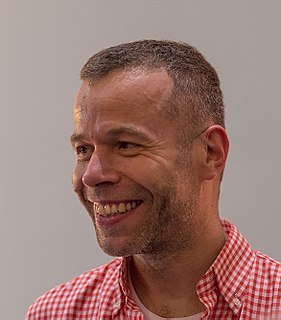
Wolfgang Tillmans is a German photographer. His diverse body of work is distinguished by observation of his surroundings and an ongoing investigation of the photographic medium’s foundations.

Marcel Reich-Ranicki was a Polish-born German literary critic and member of the literary group Gruppe 47. He was regarded as one of the most influential contemporary literary critics in the field of German literature and has often been called Literaturpapst in Germany.

Bruno Alfred Döblin was a German novelist, essayist, and doctor, best known for his novel Berlin Alexanderplatz (1929). A prolific writer whose œuvre spans more than half a century and a wide variety of literary movements and styles, Döblin is one of the most important figures of German literary modernism. His complete works comprise over a dozen novels ranging in genre from historical novels to science fiction to novels about the modern metropolis; several dramas, radio plays, and screenplays; a true crime story; a travel account; two book-length philosophical treatises; scores of essays on politics, religion, art, and society; and numerous letters—his complete works, republished by Deutscher Taschenbuch Verlag and Fischer Verlag, span more than thirty volumes. His first published novel, Die drei Sprünge des Wang-lung, appeared in 1915 and his final novel, Hamlet oder Die lange Nacht nimmt ein Ende was published in 1956, one year before his death.

Die Welt is a German national daily newspaper, published as a broadsheet by Axel Springer SE.
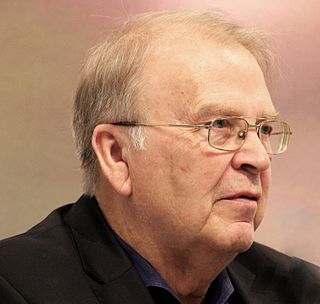
Wilhelm Genazino was a German journalist and author. He worked first as a journalist for the satirical magazine pardon and for Lesezeichen. From the early 1970s, he was a freelance writer who became known by a trilogy of novels, Abschaffel-Trilogie, completed in 1979. It was followed by more novels and two plays. Among his many awards is the prestigous Georg Büchner Prize.
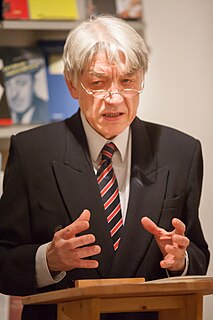
Wolfgang Kubin is a German poet, essayist, sinologist and translator of literary works. He is the former director of the Institute for Oriental and Asian Studies at the University of Bonn, Germany. Kubin has frequently been a guest professor at universities in China, for instance at Beijing Foreign Studies University, but also in Madison, Wisconsin and in Jerusalem. Since 1989, Kubin has been the editor of the journals ORIENTIERUNGEN: Zeitschrift zur Kultur Asiens and Minima sinica: Zeitschrift zum chinesischen Geist.
Wolfgang Arthur Reinhold Koeppen was a German novelist and one of the best known German authors of the postwar period.
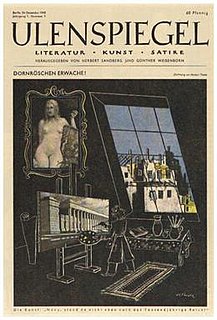
Ulenspiegel was a bi-weekly German satirical magazine published in Berlin after World War II. The magazine was an important cultural outlet in the new era of democracy and freedom following the fall of the Third Reich. Its first issue was published on 24 December 1945. The publishers were Herbert Sandberg and Günther Weisenborn; editors included Wolfgang Weyrauch, with Karl Schnog becoming editor-in-chief in 1947. Its success was stymied by politics, as the editors first clashed with the American authorities in occupied Germany in 1948, accused of being too "left-wing", and then after the magazine moved to the Soviet sector of Berlin, ran afoul of the Communists in 1950. The remaining publisher, Sandberg, lost his license to publish in 1950.
Anselm Haverkamp is a German-American professor of literature and philosophy. He received his academic education in Freiburg/Brsg, Zurich, Bonn and Konstanz. After his PhD in Heidelberg and his Habilitation in the Konstanz School of Criticism, he moved from Konstanz to Yale; since 1989 he has taught as professor of English at New York University, where he also founded the Poetics and Theory Program. Since 1994 he has served as founding member of the newly established European University Viadrina in Frankfurt an der Oder, East of Berlin. In 2009, he was made an honorary professor of philosophy at the Ludwig Maximilian University of Munich.
Wolfgang Hilbig was a German author and poet. He was a member of the Socialist Unity Party of Germany.

Jenny Erpenbeck is a German writer and opera director, recipient of the Independent Foreign Fiction Prize.
Deutscher Science Fiction Preis is a German literary award. Together with the Kurd-Laßwitz-Preis, it is one of the most prestigious awards for German science fiction literature. The award was established in 1985 by the Science Fiction Club Deutschland, a German Science Fiction society. Each year, the award is given to the best German science fiction short story and the best German novel from the previous year.
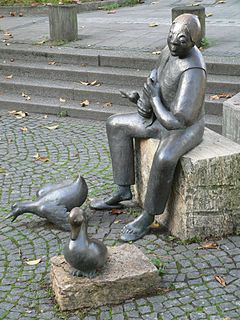
Hans Bayer, known by the pseudonym Thaddäus Troll, was a German journalist and writer and one of the most prominent modern poets in the Swabian German dialect. In his later years, he was also an active campaigner for libraries and for support, pension rights, and fair publishing contracts for writers. He was born in Cannstatt, a suburb of Stuttgart, and committed suicide there at the age of 66. The literary award Thaddäus-Troll-Preis is named in his honour.
Paola Capriolo is an Italian novelist and translator.
The Haṭhābhyāsapaddhati is a manual of Haṭha yoga written in Sanskrit in the 18th century, attributed to Kapāla Kuraṇṭaka; it is the only known work before modern yoga to describe elaborate sequences of asanas. It includes unusual elements such as rope poses. survives in a single manuscript.










